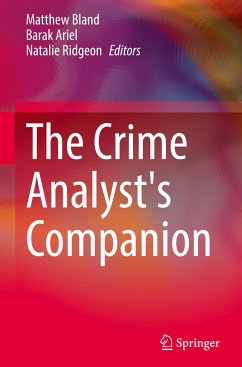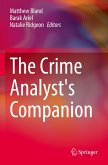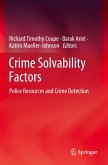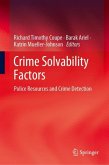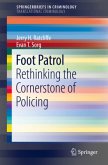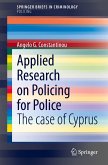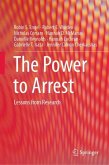The Crime Analyst's Companion
Herausgegeben:Bland, Matthew; Ariel, Barak; Ridgeon, Natalie
The Crime Analyst's Companion
Herausgegeben:Bland, Matthew; Ariel, Barak; Ridgeon, Natalie
- Gebundenes Buch
- Merkliste
- Auf die Merkliste
- Bewerten Bewerten
- Teilen
- Produkt teilen
- Produkterinnerung
- Produkterinnerung
This volume presents a collection of essays from experienced crime analysts from around the world. It explores themes relevant to anyone embarking on, or already into a career in crime analysis.
Divided into two sections, this book addresses technical issues central to the profession, from collection of data to presenting findings to reluctant audiences. It incorporates a collection of methodological case studies, demonstrating the ways analysis has made a meaningful difference to policing and security. This volume is intended for scholars who study and work with crime analysts, the global…mehr
Andere Kunden interessierten sich auch für
![The Crime Analyst's Companion The Crime Analyst's Companion]() The Crime Analyst's Companion112,99 €
The Crime Analyst's Companion112,99 €![Environmental Criminology Environmental Criminology]() Martin A. AndresenEnvironmental Criminology196,99 €
Martin A. AndresenEnvironmental Criminology196,99 €![Crime Solvability Factors Crime Solvability Factors]() Crime Solvability Factors119,99 €
Crime Solvability Factors119,99 €![Crime Solvability Factors Crime Solvability Factors]() Crime Solvability Factors119,99 €
Crime Solvability Factors119,99 €![Foot Patrol Foot Patrol]() Jerry H. RatcliffeFoot Patrol45,99 €
Jerry H. RatcliffeFoot Patrol45,99 €![Applied Research on Policing for Police Applied Research on Policing for Police]() Angelo G. ConstantinouApplied Research on Policing for Police45,99 €
Angelo G. ConstantinouApplied Research on Policing for Police45,99 €![The Power to Arrest The Power to Arrest]() Robin S. EngelThe Power to Arrest67,99 €
Robin S. EngelThe Power to Arrest67,99 €-
-
-
This volume presents a collection of essays from experienced crime analysts from around the world. It explores themes relevant to anyone embarking on, or already into a career in crime analysis.
Divided into two sections, this book addresses technical issues central to the profession, from collection of data to presenting findings to reluctant audiences. It incorporates a collection of methodological case studies, demonstrating the ways analysis has made a meaningful difference to policing and security.
This volume is intended for scholars who study and work with crime analysts, the global community of undergraduate and graduate students who may take one of these roles in the future, and law enforcement.
Divided into two sections, this book addresses technical issues central to the profession, from collection of data to presenting findings to reluctant audiences. It incorporates a collection of methodological case studies, demonstrating the ways analysis has made a meaningful difference to policing and security.
This volume is intended for scholars who study and work with crime analysts, the global community of undergraduate and graduate students who may take one of these roles in the future, and law enforcement.
Produktdetails
- Produktdetails
- Verlag: Springer / Springer International Publishing / Springer, Berlin
- Artikelnr. des Verlages: 978-3-030-94363-9
- 1st edition 2022
- Seitenzahl: 272
- Erscheinungstermin: 28. April 2022
- Englisch
- Abmessung: 241mm x 160mm x 21mm
- Gewicht: 576g
- ISBN-13: 9783030943639
- ISBN-10: 3030943631
- Artikelnr.: 63080100
- Herstellerkennzeichnung Die Herstellerinformationen sind derzeit nicht verfügbar.
- Verlag: Springer / Springer International Publishing / Springer, Berlin
- Artikelnr. des Verlages: 978-3-030-94363-9
- 1st edition 2022
- Seitenzahl: 272
- Erscheinungstermin: 28. April 2022
- Englisch
- Abmessung: 241mm x 160mm x 21mm
- Gewicht: 576g
- ISBN-13: 9783030943639
- ISBN-10: 3030943631
- Artikelnr.: 63080100
- Herstellerkennzeichnung Die Herstellerinformationen sind derzeit nicht verfügbar.
Dr Matthew Bland is an Associate Professor in Evidence-Based Policing at the Institute of Criminology, University of Cambridge, a Research Fellow at the Cambridge Centre for Evidence-Based Policing and a fellow of the Academy of Experimental Criminology of the American Society of Criminology. At the university, he supervises the dissertations of senior police leaders in the Police Executive Programme. He is the Trial Director for the national pilot of polygraph testing for domestic abuse offenders and has managed and contributed to experiments on offender management, hotspot policing and out-of-court disposals. His research focuses on domestic abuse, prediction algorithms in policing and exploratory analyses. He previously worked in policing for 15 years as a Head of Analysis, during which time he completed both a master's and a PhD in criminology at the University of Cambridge. Dr Barak Ariel is a Professor of Experimental Criminology at the Institute ofCriminology, University of Cambridge, and an Associate Professor at the Institute of Criminology in the Faculty of Law, Hebrew University of Jerusalem. He is a fellow at the Jerry Lee Centre of Experimental Criminology and at the Division of Experimental Criminology of the American Society of Criminology, which he presently chairs. Ariel has been involved in dozens of experiments representing a wide range of issues in law enforcement, including organised crime, offender management, counterterrorism, legitimacy, neighbourhood policing, restorative justice, domestic violence, crime and place, body-worn cameras, tasers and the broader use of technology. Much of this body of work appears in over 100 academic articles and books. Ariel sits on multiple evaluation panels and has served as an adviser to policing and security agencies around the globe, reviewing their impact evaluations and evidence-based practices largely through randomised controlled trials. Natalie Ridgeon isa Performance Analyst working for Norfolk and Suffolk Constabularies in the East of England. She has been a practising crime analyst and researcher since 2014 during which time she has covered a variety of operational and strategic topics including victim surveying, tactical assessments and performance framework development.
1. An introduction to crime analysis.- 2. Why does a crime analyst need a companion?.- Part I. The Crime Analysis Profession.- 3. Different types of crime analyst?.- 4. Crime analysis in an international context.- 5. The role of crime analysis in evidence-based policing.- 6. Building the analyst you want to be.- 7. Analysts from a Police Commander's perspective.- 8. The literature on Crime Analysis.- Part II. Techniques for Crime Analysis.- 9. An overview of analytical techniques.- 10. Constructing a question and shaping an answer.- 11. An overview of GIS in policing.- 12. The development of a new capability: geographic profiling analysis in Australia.- 13. Integration of geographic profiling with forensic intelligence to target serial crime.- 14. Working on major crime investigations.- 15. Crime harm indices.- 16. Problem solving and SARA.- 17. Analysing descriptive results.- 18. Algorithms.- 19. Reports and data visualisation.- 20. Statistics for analysts.- 21. Criminological theories for analysts.- 22. Landing your recommendations.- 23. Partnering with police.- 24. Dealing with difficult cops.- Part III. Analysts making a difference in Law enforcement decision making: case studies.- 25. Geo profiling.- 26. Major crime.- 27. Targeting analysis.- 28. Algorithm.- 29. Evaluation.- 30. Implementing evidence: developing data analysis as a sustainable capability.- Part IV. Conclusions.- 31. The future of the role.- 32. Concluding thoughts.
1. An introduction to crime analysis.- 2. Why does a crime analyst need a companion?.- Part I. The Crime Analysis Profession.- 3. Different types of crime analyst?.- 4. Crime analysis in an international context.- 5. The role of crime analysis in evidence-based policing.- 6. Building the analyst you want to be.- 7. Analysts from a Police Commander's perspective.- 8. The literature on Crime Analysis.- Part II. Techniques for Crime Analysis.- 9. An overview of analytical techniques.- 10. Constructing a question and shaping an answer.- 11. An overview of GIS in policing.- 12. The development of a new capability: geographic profiling analysis in Australia.- 13. Integration of geographic profiling with forensic intelligence to target serial crime.- 14. Working on major crime investigations.- 15. Crime harm indices.- 16. Problem solving and SARA.- 17. Analysing descriptive results.- 18. Algorithms.- 19. Reports and data visualisation.- 20. Statistics for analysts.- 21. Criminological theories for analysts.- 22. Landing your recommendations.- 23. Partnering with police.- 24. Dealing with difficult cops.- Part III. Analysts making a difference in Law enforcement decision making: case studies.- 25. Geo profiling.- 26. Major crime.- 27. Targeting analysis.- 28. Algorithm.- 29. Evaluation.- 30. Implementing evidence: developing data analysis as a sustainable capability.- Part IV. Conclusions.- 31. The future of the role.- 32. Concluding thoughts.

